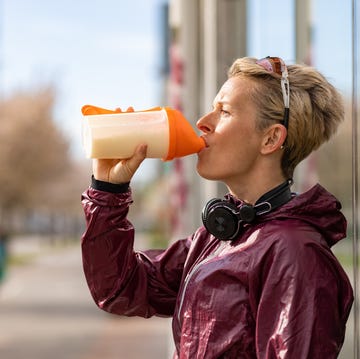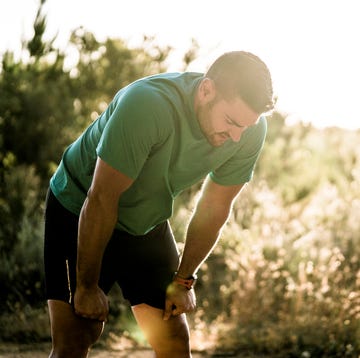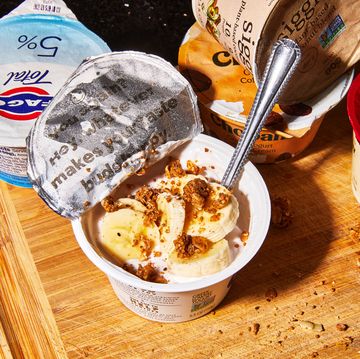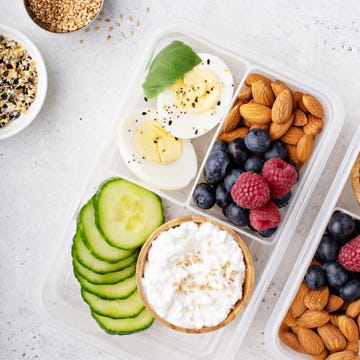Bad Habit: Bingeing in the Evening
You run in the morning but don’t eat much all day because you’re dealing with life and then you binge at dinner and beyond.
Break the Cycle
Take healthy food wherever you go. “We eat what’s convenient and in sight,” says Brian Wansink, Ph.D., director of the Cornell Food and Brand Lab. He recommends appetite-satisfying foods that travel well, like nuts, apples, and string cheese. Sit down as early as possible for a balanced dinner. Still hungry? Take a few bites—then wait 15 minutes. Wansink’s studies suggest that the first few bites deliver most of the pleasure. “Small-portion snackers are equally satisfied as regular-portion snackers,” he says.
Bad Habit: Too Many Energy Bars
We like energy bars as much as any runner, but they can top out at 300-plus calories. Plus, “they’re loaded with processed ingredients and preservatives,” says RunDisney nutritionist Tara Collingwood, R.D.N.
Break the Cycle
Reserve energy bars for times when you truly need them—like before or after a hard workout, or when you don’t have access to a full-on meal. Look for bars with few ingredients and less than 10 grams of sugar per 150 calories. Better yet, reach for whole foods, like a banana or a snacksized servings of almonds. “Whole foods give your body more bang for the buck by providing it with additional nutrients like fiber and antioxidants,” says Collingwood.
RELATED: Prep great meals (in less time!) with Six Bad Diet HabitsAnd How to Break Them.
Bad Habit: Eating Huge Portions
Long runs spike your hunger, but “your body can’t process a huge dose of calories, even when your glycogen stores are spent,” says Collingwood. “When you eat too much at one time, you risk storing it as fat.”
Break the Cycle
Fuel adequately and drink enough water during your long runs; skimping on either can unleash postrun hunger. Serve your recovery meal on a small plate. Wansink’s research suggests you’ll eat less but feel just as satisfied. If you’re hungry later, eat another minimeal; you absorb more nutrients from modest portions than from gut bombs.
Bad Habit: Overloading on Carbs
Yes, runners need carbs, and crackers and cereal are fast, easy, and satisfying. The problem, says Collingwood, is when you eat just pasta and forget about the nutrient-dense veggies your body needs for optimal running performance.
Break the Cycle
Fruits, veggies, and other high-fiber foods like lentils and legumes (beans) should fill half your plate—on first helpings and seconds. Want another scoop of pasta? That’s fine, so long as you match it with an equal portion of salad. The result: You feel full faster, and end up replacing some of the starches you would’ve eaten with lower-calorie, high-nutrient foods.
Bad Habit: Postrun Beer or Three
Sure it’s fun to socialize postrun, but beer loads you up on empty calories (about 150 per glass). “To burn off just one drink, you have to add an extra mile to your next run,” says Collingwood.
Break the Cycle
Yes, you can order soda water instead of IPA. But if just being in the bar creates temptation, try to feed your need for camaraderie through other routines. Propose meeting pals for a morning run to the coffee shop (minus the whole-fat mocha lattes). Or start and end runs at your local running shop, where you can treat yourself to an alcohol-free reward—like new socks or shoes.
Bad Habit: Run Hard, Eat Harder
You just ran a tough workout. Time for a burger, beer, fries, and ice cream! Right? According to Wansink’s research, people who view their exercise as hard tend to eat more. In one study, people who heard they were doing a 2K “exercise walk” ate twice as many sweets afterward as those who thought they were logging a 2K “scenic walk.” In another study, relay marathoners who reported having fun chose healthier snacks than runners who reported difficulty.
Break the Cycle
Don’t think you can eat anything you want after a run; have a normal meal. And reframe your workout as a positive experience. “Make your runs seem fun,” says Wansink. “Anything that brings a smile will make it more likely you’ll eat less afterward.”


















